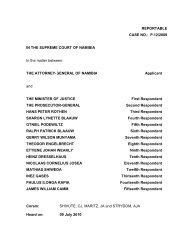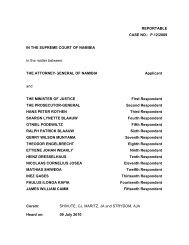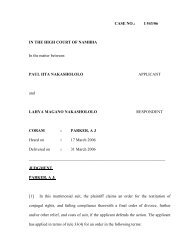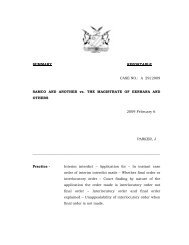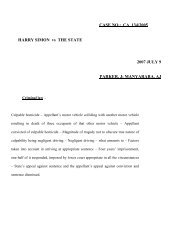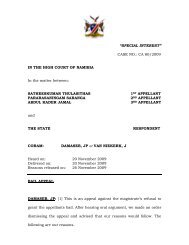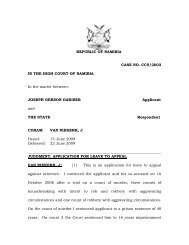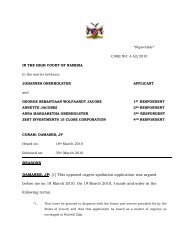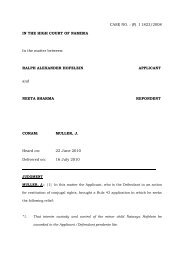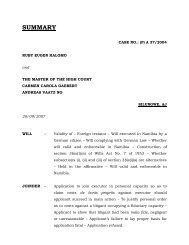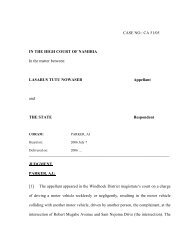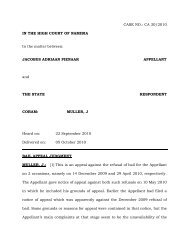The State vs Eradius Kauleefelwa - Superior Courts of Namibia
The State vs Eradius Kauleefelwa - Superior Courts of Namibia
The State vs Eradius Kauleefelwa - Superior Courts of Namibia
You also want an ePaper? Increase the reach of your titles
YUMPU automatically turns print PDFs into web optimized ePapers that Google loves.
THE STATE v ERADIUS KAULEEFELWACASE NO. CR 61/20052005/06/16Damaseb, J.P. et Maritz, J.CRIMINAL PROCEDURESTOCK THEFT ACTCriminal procedure – s 114 – committal <strong>of</strong>accused by district magistrate’s court toregional court for sentence – section conferslimited powers <strong>of</strong> review to regionalmagistrate – powers <strong>of</strong> regional magistrateunder section discussedStock theft – Stock <strong>The</strong>ft Act not creatingsubstantive crime <strong>of</strong> stock theft – theft <strong>of</strong>stock still common law crime <strong>of</strong> theft withdistinguishing feature that stock or produceconstitutes subject matter <strong>of</strong> theft – valuethere<strong>of</strong> not element <strong>of</strong> crime – failure <strong>of</strong>accused to unequivocally admit value durings 112(1)(b) enquiry not justifying conviction tobe set aside under s 114(3)(a) <strong>of</strong> CPACriminal procedure – minimum sentencesprescribed by s 14 <strong>of</strong> Stock <strong>The</strong>ft Act –unrepresented accused to be informed andimplications there<strong>of</strong> to be explained –opportunity to be afforded to accused toadduce evidence <strong>of</strong> substantial andcompelling circumstances justifying lessersentence
2CASE NO. CR 61 /2005IN THE HIGH COURT OF NAMIBIAIn the matter between:THE STATEversusERADIUS KAULEEFELWA(SPECIAL REVIEW: HIGH COURT CASE NO. 811/2005)CORAM: DAMASEB, J.P. et MARITZ, J.Delivered on: 2005-06-16_____________________________________________________________________SPECIAL REVIEW JUDGMENTMARITZ, J.: <strong>The</strong> accused was arraigned before the magistrate,Eenhana, on a charge <strong>of</strong> theft taking into consideration the provisions<strong>of</strong> sections 11(1)(a), 1, 14 and 17 <strong>of</strong> the Stock <strong>The</strong>ft Act, 1990 asamended (the “Act”). He pleaded guilty to the charge and, after themagistrate had satisfied herself during an inquiry in terms <strong>of</strong> s.
3112(1)(b) <strong>of</strong> the Criminal Procedure Act, 1977 (the “Code”), that theaccused had intended to plead guilty, she convicted him as charged.She thereupon stopped the proceedings in the district magistrate’scourt and committed the accused in terms <strong>of</strong> s. 114 <strong>of</strong> the Code forsentence in the regional magistrate’s court for that area.Although the record <strong>of</strong> proceedings in the district magistrate's courtwas proved and received by the regional court as part <strong>of</strong> the record <strong>of</strong>that court, the regional magistrate declined to make a formal finding <strong>of</strong>guilty and to sentence the accused. Instead, he forwarded the recordto this Court on “special review”. <strong>The</strong> reasons for that decision appearfrom both the record <strong>of</strong> proceedings forwarded on special review andthe accompanying letter. It will suffice if I quote the letter verbatim:“1. Accused was convicted <strong>of</strong> stock theft after he pleaded guilty tothe charge. <strong>The</strong> case was transferred to the regional court forsentence to be imposed in terms <strong>of</strong> section 3 <strong>of</strong> the Stock <strong>The</strong>ftAmendment Act, 2004 (No. 19 <strong>of</strong> 2004).2. After I read through the record <strong>of</strong> the district court, I was notfully satisfied that the value <strong>of</strong> the cattle as alleged in thecharge has been established in view <strong>of</strong> the fact that no evidencewas led in that regard. Though accused said that he did notdispute the value, that mere saying, in my view, is not anunequivocal admission <strong>of</strong> the value <strong>of</strong> the cattle.3. <strong>The</strong> value <strong>of</strong> the stock is very essential for the purpose <strong>of</strong>sentence. It is therefore my view that if the <strong>State</strong> alleges acertain value <strong>of</strong> the stock, evidence must be led to prove thevalue.
44. It is for the above reason that I have decided to send thismatter for special review. ....”Prudent as it might have been, the course <strong>of</strong> conduct followed by theregional magistrate appears to be both inappropriate andimpermissible. Section 114(3) <strong>of</strong> the Code indirectly confers a limitedform <strong>of</strong> review upon regional courts in cases where accused personsare committed to that court for sentence. (See: Du Toit et al.,Commentary on the Criminal Procedure Act, p. 17-17) It provides asfollows:“(a) Unless the regional court concerned –(i) is satisfied that a plea <strong>of</strong> guilty or an admission by theaccused which is material to his guilt was incorrectlyrecorded; or(ii) is not satisfied that the accused is guilty <strong>of</strong> the <strong>of</strong>fence <strong>of</strong>which he has been convicted and in respect <strong>of</strong> which hehas been committed for sentence,the court shall make a formal finding <strong>of</strong> guilty and sentence theaccused.(b)If the Court is satisfied that a plea <strong>of</strong> guilty or an admission bythe accused which is material to his guilt was incorrectlyrecorded, or if the Court is not satisfied that the accused isguilty <strong>of</strong> the <strong>of</strong>fence <strong>of</strong> which he has been convicted and inrespect <strong>of</strong> which he has been committed for sentence or that hehas no valid defence to the charge, the Court shall enter a plea<strong>of</strong> not guilty and proceed with the trial as a summary trial inthat court: provided that any admission by the Accused therecording <strong>of</strong> which is not disputed by the accused, shall standas pro<strong>of</strong> <strong>of</strong> the fact thus admitted.”
5<strong>The</strong> Magistrate is correct in his assessment that the accused’sresponse to the district magistrate’s question regarding the value <strong>of</strong>the stolen cattle does not constitute an unequivocal admission. Hisanswer falls significantly short <strong>of</strong> an admission that the assessedvalue <strong>of</strong> N$7 000 was correct. But, however important the value <strong>of</strong> thestolen livestock may be for purposes <strong>of</strong> sentence, it is not part <strong>of</strong> theessential elements <strong>of</strong> the crime. <strong>The</strong> theft <strong>of</strong> livestock is not asubstantive crime existing in common or statutory law independently<strong>of</strong> the common law crime <strong>of</strong> theft. It is simply a manifestation there<strong>of</strong>.In R v Makamba, 1943 OPD 53, Van den Heever J had the opportunityto deal with the provisions <strong>of</strong> the Union Stock <strong>The</strong>ft Act, No. 26 <strong>of</strong>1923. He said (at page 54):“Act 26 <strong>of</strong> 1923 created a number <strong>of</strong> <strong>of</strong>fences, but stock theft is notone <strong>of</strong> them. <strong>The</strong> Legislature assumed that the incidents <strong>of</strong> the crime<strong>of</strong> theft were well known and required no further definition where thething stolen happened to be stock or produce <strong>of</strong> stock. All it did wasto provide new procedures, additional penalties and extendedjurisdiction in every case <strong>of</strong> theft in which a certain factual elementemerges, i.e. where the thing stolen is stock or produce <strong>of</strong> stock.<strong>The</strong> form <strong>of</strong> charge commonly used (U.D.J.12) seems to me correct inconception: the charge is one <strong>of</strong> theft only and in fairness to theaccused, and as an act <strong>of</strong> supererogation, he is warned <strong>of</strong> theprovisions <strong>of</strong> Act 26 <strong>of</strong> 1923. Sec. 11 <strong>of</strong> the Act leaves no room fordoubt as to the intention <strong>of</strong> the Legislature; it provides that ‘theprovisions <strong>of</strong> this Act shall apply in every case where an accused
6person is indicted, summoned or charged in respect <strong>of</strong> the theft <strong>of</strong>stock or produce, notwithstanding the fact that this Act be notreferred to in such indictment, summons or charge’.”I pause here to note that s. 12 <strong>of</strong> the Act reads exactly the same as s.11 <strong>of</strong> the now repealed Act 26 <strong>of</strong> 1923 (RSA). This interpretation als<strong>of</strong>ound favour in the Appellate Division <strong>of</strong> the Supreme Court <strong>of</strong> SouthAfrica in the matter <strong>of</strong> Minister van Justisie; in re R v Menyuka and R vNqwelo, 1960(3) SA 370(A) where Beyers, JA said at 374A-B:“Hoewel die veediefstal wet sekere handelinge spesiaal strafbaar stelwat nie gemeenregtelik strafbaar was nie, poog die wet geensins omdiefstal van vee tot misdaad te verklaar nie. Veediefstal kan dus asniks anders beskou word as die gewone gemeenregtelike diefstal nie,met die onderskeidende factor … dat vee die gesteelde voorwerpuitmaak.”(Trans: Although the Stock <strong>The</strong>ft Act makes certain conduct, which hasnot been punishable under common law, specially punishable, the Actdoes not attempt at all to declare the theft <strong>of</strong> stock a crime. <strong>The</strong> theft <strong>of</strong>stock can therefore not be regarded as anything but common law theft,with the distinguishing feature … that stock constitutes the stolenobject.)<strong>The</strong> essential elements <strong>of</strong> the theft <strong>of</strong> stock is therefore no differentthan that <strong>of</strong> common law theft i.e. “(a) unlawful; (b) contrectatio; (c)intent to steal; (d) property capable <strong>of</strong> being stolen” (See: Milton,South African Criminal Law and Procedure, Vol. 2 (3 rd ed.), p. 585) –with the distinguishing feature that the “property” is constituted <strong>of</strong>“stock” or “produce” as defined in s. 1 <strong>of</strong> the Stock <strong>The</strong>ft Act, 1990.
7Although Snyman, Criminal Law, (4 th ed.) at p. 469, criticises thedefinition <strong>of</strong> “theft” by Milton and pr<strong>of</strong>fers a more extensive one,neither he nor any <strong>of</strong> the other authorities which I have consulted,includes the value <strong>of</strong> the goods stolen as one <strong>of</strong> the essential elements<strong>of</strong> the crime.By mentioning the estimated value <strong>of</strong> the stock in the indictment,summons or charge, the prosecution does not purport to elevate it tothe status <strong>of</strong> an element <strong>of</strong> the crime. <strong>The</strong> <strong>State</strong> does not therebyassume the duty to prove it beyond reasonable doubt in order tosecure a conviction. It is simply recorded to alert the court to thedegree <strong>of</strong> seriousness with which the commission <strong>of</strong> the theft falls tobe considered and that the case does not fall, for instance, within thepurview <strong>of</strong> the de minimus-rule.<strong>The</strong> accused admitted during the s. 112(1)(b)-inquiry in the districtmagistrate's courts to all the essential elements <strong>of</strong> the crime <strong>of</strong> theft <strong>of</strong>stock. Having done so, the regional magistrate should have made aformal finding <strong>of</strong> guilty unless, <strong>of</strong> course, any <strong>of</strong> the otherconsiderations referred to in s. 114(3)(a)(ii) <strong>of</strong> the Code were present.I must also point out that, in terms <strong>of</strong> s. 114(4), the provisions <strong>of</strong> s.112(3) <strong>of</strong> the Code also apply to the proceedings after the regionalmagistrate has noted a formal finding <strong>of</strong> guilty. That subsectionprovides as follows:
8“Nothing in this section shall prevent the prosecutor from presentingevidence on any aspect <strong>of</strong> the charge, or the Court from hearingevidence, including evidence or a statement by or on behalf <strong>of</strong> theaccused, with regard to sentence, or from questioning the accused onany aspect <strong>of</strong> the case for the purposes <strong>of</strong> determining an appropriatesentence.”Given the regional magistrate’s view that the value <strong>of</strong> the livestockstolen had not been unequivocally admitted by the accused, he was atliberty to record that view and left it to the prosecutor to presentevidence on the value <strong>of</strong> the cattle. If it is the prosecution’s case thatthe value <strong>of</strong> the cattle was N$500-00 or more and that the provisions<strong>of</strong> s. 14(1)(a)(ii) <strong>of</strong> the Act apply (requiring, in the absence <strong>of</strong>substantial and compelling circumstances, the imposition <strong>of</strong> aminimum sentence <strong>of</strong> no less than 20 years imprisonment without theoption <strong>of</strong> a fine in the case <strong>of</strong> a first conviction) it has to prove suchvalue. In the absence <strong>of</strong> such pro<strong>of</strong>, the magistrate will be constrainedto apply the provisions <strong>of</strong> s. 14(1)(a)(i) and to sentence the accused, ifhe is a first <strong>of</strong>fender, to imprisonment for a period <strong>of</strong> not less than 2years without the option <strong>of</strong> a fine. <strong>The</strong> accused, I should add, is notlegally represented and it is therefore the duty <strong>of</strong> the magistrate toexplain to him the provisions and implications <strong>of</strong> s. 14 <strong>of</strong> the Act. Hemust be afforded an opportunity to take issue with the value <strong>of</strong> thestolen cattle contended for by the prosecution and to adduce pro<strong>of</strong> <strong>of</strong>the existence <strong>of</strong> substantial and compelling circumstances.
9I should also draw the regional magistrate’s attention to the provisions<strong>of</strong> s. 114(3)(b) <strong>of</strong> the Code. If he was not satisfied that the plea <strong>of</strong>guilty or a material admission made by the accused was correctlyrecorded or, if for any other reason he was not satisfied that theaccused was guilty <strong>of</strong> the <strong>of</strong>fence, he was entitled to enter a plea <strong>of</strong> notguilty and to proceed with the trial on a summary basis. It wastherefore not necessary for him to forward the record <strong>of</strong> proceedings tothis Court on special review in order to set aside the conviction in thedistrict magistrate's court. As it is, s. 304 <strong>of</strong> the Code only allows thisCourt to exercise its powers on special review after an accused hasbeen sentenced.It is for these reasons that this Court declines to exercise its powers <strong>of</strong>special review. In the result this case is remitted to the regionalmagistrate to dispose <strong>of</strong> it in accordance with the provisions <strong>of</strong> s. 114<strong>of</strong> the Criminal Procedure Act, 1977.________________MARITZ, J.I concur.________________DAMASEB, JP.



